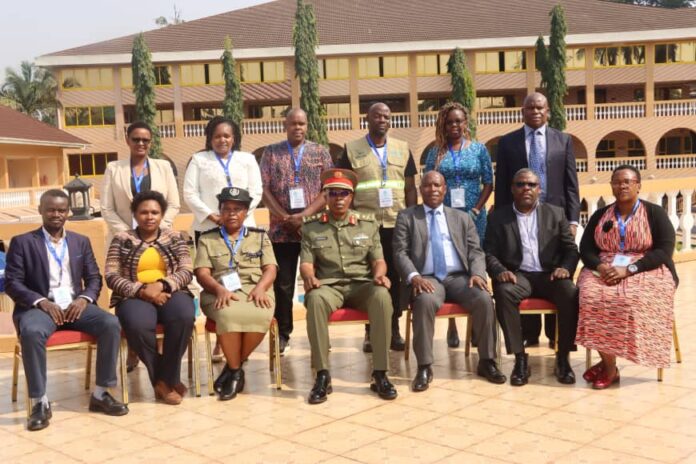
The East African Standby Force (EASF) has convened in Uganda for a three-day conference with key stakeholders from early warning agencies with the goal of improving the functionality of the Early Warning System throughout the region.
The standby force convened so as to improve regional collaboration towards preventing and resolving conflicts, promoting situational awareness, and developing a coordinated response in order to handle the emerging threats and crises, particularly within Uganda.
According to Brig Gen Richard Karemire, who represented the Chief of Joint Staff during the event held at Hotel Africana on August 19, 2024, the meeting served as a demonstration of the integrated commitment of member states towards conflict prevention and fostering a culture of peacebuilding in the region.
“As you are aware, early warning systems in general aim to mitigate the risk produced by disasters,” Brig Gen Karemire said.
He said that by providing an advanced notice, the early warning systems enable individuals, communities, organizations, and states to take appropriate measures to minimize or deter dangers.
“I acknowledge the significant strides made by the EASF Department of Peace Operations in developing an integrated and functional EASF early warning response system and a collaboration framework between the early warning system and member states early warning system,” Brig Gen Karemire noted.
Gen Kalemire further emphasized the need for timely information sharing and the adoption of best practices in early warning systems so as to promote peace and reduce violence.
He called for investing in advanced technologies in order to strengthen early warning capabilities, support secure information exchange, and enable rapid responses to challenges such as drought, crop failures, and famine, which can ignite conflicts.
The General emphasized that achieving sustainable peace in East Africa requires a combined commitment by all stakeholders and the empowerment of local communities where conflicts often arise.
“A proactive approach is essential, drawing on diverse expertise and shared experiences to preemptively tackle challenges,” he added.
Brig Gen Domitien Kabisa, the Head of Peace Support Operations at the EASF Secretariat in Nairobi, described the meeting as a pivotal step towards achieving a key goal for 2024.
“We need to enhance collaboration between the EASF Early Warning System and the systems of member states to bolster conflict prevention capabilities and enable timely responses to regional security issues,” he said.
He echoed the importance of enhanced regional cooperation in improving the capacity to predict, prevent, and manage tensions and avert violent conflicts in light of the region’s complex history of strife.
Gen Kabisa noted that strengthening collaboration between member states’ early warning systems would aid in identifying early indicators of violent conflict and ensure that appropriate interventions are made to mitigate the potential for such violence to escalate.
The Kampala meeting serves as a follow-up to a previous gathering in Addis Ababa, Ethiopia, where Uganda played a crucial role in establishing a collaborative framework among member states for effectively implementing early warning mechanisms.
The framework received endorsement from the region’s policy organs, which include the Chiefs of Defense Forces and the Ministers of Defense and Security.
The EASF, which was established in 2007 and reached full operational capability in December 2015, is the product of several factors that have defined regional integration in the field of peace and security in Eastern Africa and the Horn of Africa, including long-standing and continuing tensions between countries of the region and the threats to peace and security with internal wars, environmental degradation, terrorism, and unconstitutional changes of government notwithstanding.
The EASF, comprising ten member states, including Burundi, Comoros, Djibouti, Ethiopia, Kenya, the Seychelles, Rwanda, Somalia, Sudan, and Uganda, has its legitimacy stemming from Chapter VIII of the United Nations Charter, Article IV of the African Union Constitutive Act, and Article XIII of the Protocol establishing the AU Peace and Security Council.














